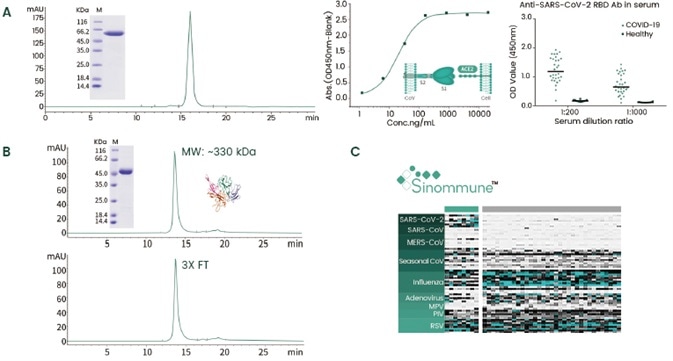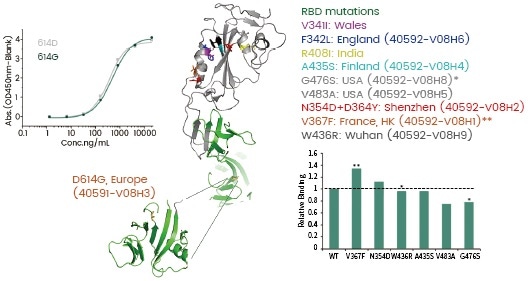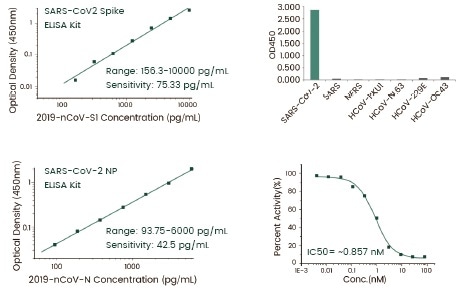The ongoing COVID-19 pandemic has caused widespread devastation on an international scale. While a number of vaccine candidates have since demonstrated promising results, combatting the invisible enemy remains a significant task.
The battle occurs on many fronts, with the design of therapeutic medications, diagnostic agents, as well as contact tracing strategies being the most crucial factors for detecting and treating those who are infected. Thus, it is key to develop high-quality research tools to facilitate such endeavors.
Since SARS-CoV-2 was first identified as a novel coronavirus, a considerable amount of information was compiled that identified SARS-CoV-2 as an RNA virus that infects host cells by interacting with the cell surface ACE2 receptor.
Later studies also determined that TMPRSS2 was another host protein that enabled virus invasion. With the publication of the virus genome information, Sino Biological has developed several research tools to support the study of virus biology.
These include detailed mapping of its interaction pattern with the host, tracing its mutations and assessing their impact on current therapeutics, as well as pinpointing immune-epitopes by the host immune system against viral fragments.
The toolbox primarily contains recombinant proteins from the SARS-CoV-2 virus and other coronavirus strains, anti-virus antibodies and pseudovirus based on the SARS-CoV-2 spike protein.
Recombinant virus proteins
The principal elements of the SARS-CoV-2 virus particles are proteins with spike protein (S) and nucleocapsid protein (NP) is the most copious. S protein is the attachment and entry point of the virus by interfacing with ACE2, while NP is critical for stabilizing the virus genome.
Acquiring high-quality virus proteins is crucial since the proteins are the primary starting material for the genesis of detecting antibodies in serologic tests and screening for agents that impede the virus-host interactions.
Utilizing recombinant protein expression technology, Sino Biological has effectively produced biologically active S and NP proteins of SARS-CoV-2 and other coronaviruses (Figure 1A and 1B).
In combination with proteins from other seasonal upper respiratory system viruses, the development of a chip-based high-throughput screening method (Sinommune) has also been completed for rapid identification of those infected with the possibility to contribute to the virus tracking (Figure 1C).

Figure 1. Examples of high-quality recombinant SARS-CoV-2 S (A) and NP (B) proteins and the high-throughput Sinommune fast screening chip (C). The S1 domain of S protein was expressed in HEK293 via transient transfection. The high purity protein has confirmed ACE2 binding activity (A bottom left) and can be used to detect anti-CoV-2 antibodies from patient serum (A bottom right). The full-length NP was expressed in E.coli and the protein appeared to exert a stable oligomeric status after 3X freeze-thaw (3X FT, B bottom). Image Credit: Sino Biological Inc.
RNA viruses are renowned for their excessive mutation rate, and since the discovery of SARS-CoV-2, multiple mutations have been reported. These mutations are the evolution strategies of the virus for host adaptation, and they might impede the efficacy of the current therapeutics and the accuracy of the diagnostic tests.
Scientists at Sino Biological are constantly looking out for new mutations, specifically in the receptor-binding domain (RBD) of the S protein, within which the ACE2 binding plain resides.
A sophisticated recombinant RBD mutation library has been created with over 50 recombinant RBD mutants deposited. Other high-frequency mutations, including the dominant D614G mutation, have also been introduced into the library to create a mutant array for broad-spectrum screening of anti-CoV-2 antibodies (Figure 2).

Figure 2. Mutations in S protein with fluctuated ACE2 binding activities. Image Credit: Sino Biological Inc.
As well as structural proteins such as S and NP, SARS-CoV-2 is also dependent on a sequence of non-structural proteins (NSPs), including a number of enzymes and their accessory proteins, for its reproduction and assembly.
These NSPs have been proven to be key candidates for the screening of small molecule drugs to hinder virus RNA reverse-transcription and virus protein processing.
A group of SARS-CoV-2 enzymes, including papain-like protease, 3C-Like proteinase and methyltransferase, have been manufactured in E.coli with activities confirmed by fluorescent peptide-based assays to assist such work.
Anti-virus antibodies and pseudoviruses
Anti-virus antibodies are crucial ingredients in serologic tests and tools for therapeutics development and vaccine evaluation. To acquire highly sensitive antibodies with high specificity, numerous platforms were utilized, including the re-evaluation of the existing SARS antibodies and novel immune library generation via immunization campaigns.
Antibodies with preferred sensitivities were combined and formulated into ELISA kits for SARS-CoV-2 detection, while a number of antibodies with neutralization functionalities were also determined (Figure 3).

Figure 3. Applications of anti-SARS-CoV-2 antibodies. Left: antibodies pairs with high sensitivities for ELISA-based assays of CoV-2 virus and virus proteins. Right: a neutralizing antibody with no cross-reactivity against the S proteins of other coronavirus strains generated by phage-display. Image Credit: Sino Biological Inc.
Pseudoviruses contain the viral component of interest (S protein for SARS-CoV-2). These artificial virus particle assemblies activate a report gene that is internalized into the host cells.
Without endogenous reproduction abilities, these particles are exceptional when used as tools to assess host cell invasion and screen for blocking agents that interrupt the S protein-ACE2 interaction.
Additionally, pseudoviruses are relatively simple to manipulate, and a range of mutations can be introduced into the S protein portion to evaluate the potential virulence of the mutated viruses.
Sino Biological has determined an HIV-1 based pseudovirus system exhibiting SARS-CoV-2 spike protein and an ACE2 over-expressing HEK293 cell line for evaluating pseudovirus internalization.
In addition to the WT S protein, a pseudovirus carrying the S protein with the dominant D614G mutation was also produced. Host cell invasion experiment demonstrated that the 614G variant of pseudovirus was more potent in host cell infection (Figure 4).

Figure 4. SARS-CoV-2 pseudovirus infecting an ACE2 over-expressing HEK293 cell line. Left: detecting virus internalization by fluorescent microscopy. Right: host cell infected with pseudoviruses containing 614D strain (WT) S protein and 614G strain S protein, respectively. 614G strain was more potent in host cell invasion. Image Credit: Sino Biological Inc.
It is worth noting that with the present pseudovirus platform, it is possible to generate a pseudovirus with single or multiple mutations to assess their infection potential and use these pseudoviruses as a foundation for screening of broad-spectrum neutralizing antibodies that are minimally influenced by these mutations.
Summary
This article highlights the tools that Sino Biological has developed for SARS-CoV-2 researches.
The toolset is comprised of (1) a recombinant protein library with a comprehensive collection of SARS-CoV-2 structural proteins (S and S mutants as well as NP) and NSPs (enzymes and accessory proteins) for essential biochemistry studies and anti-viral drug discoveries; (2) a sophisticated library of extremely specific anti-CoV-2 antibodies for the development of diagnostic assays; and (3) a pseudovirus system for the discovery of broad-spectrum neutralizing antibodies.
About Sino Biological Inc.

Sino Biological is an international reagent supplier and service provider. The company specializes in recombinant protein production and antibody development. All of Sino Biological's products are independently developed and produced, including recombinant proteins, antibodies and cDNA clones. Sino Biological is the researchers' one-stop technical services shop for the advanced technology platforms they need to make advancements. In addition, Sino Biological offers pharmaceutical companies and biotechnology firms pre-clinical production technology services for hundreds of monoclonal antibody drug candidates.
Sino Biological's core business
Sino Biological is committed to providing high-quality recombinant protein and antibody reagents and to being a one-stop technical services shop for life science researchers around the world. All of our products are independently developed and produced. In addition, we offer pharmaceutical companies and biotechnology firms pre-clinical production technology services for hundreds of monoclonal antibody drug candidates. Our product quality control indicators meet rigorous requirements for clinical use samples. It takes only a few weeks for us to produce 1 to 30 grams of purified monoclonal antibody from gene sequencing.
Sponsored Content Policy: News-Medical.net publishes articles and related content that may be derived from sources where we have existing commercial relationships, provided such content adds value to the core editorial ethos of News-Medical.Net which is to educate and inform site visitors interested in medical research, science, medical devices and treatments.